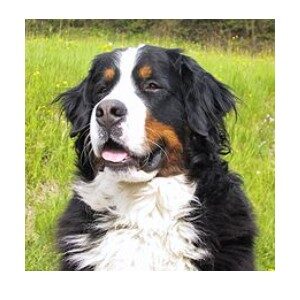Bernese Mountain Dog Bed
A Comfortable Orthopedic Bed Is Best!
Introduction
The Bernese Mountain Dog bed takes into account their health, sleeping style and preferences. An orthopedic bed is the best choice. The reason is that this breed can suffer from aching joints and muscles, and arthritis. Orthopedic beds provide the best comfort for these health issues.
Bernese Mountain Dogs, affectionately known as “Berners,” are a beloved breed recognized for their striking tri-color coat, gentle demeanor, and strong working instincts. Originating from the Swiss Alps, these dogs were historically used for herding cattle, pulling carts, and serving as loyal farm companions.
Today, they are cherished family pets, admired for their calm and friendly nature. While they are known for their loyalty and affectionate behavior, owning a Bernese Mountain Dog comes with certain responsibilities, including attention to their dietary needs, regular health check-ups, and early socialization.
With proper care and understanding, these gentle giants can become devoted members of any household, bringing joy and companionship to their families.
In this article we will share information about the Bernese Mountain Dog that potential new owners may be aware of so they can determine if they want one.
The information will include facts and fun facts, best beds and brands, health and behavioral issues, costs of ownership, new owner responsibilities, and safe foods and foods to avoid.
Best Dog Bed Types for Bernese Mountain Dogs
- Orthopedic Dog Beds:
- Description: These beds provide excellent support for the joints and muscles, which is crucial for large breeds prone to hip dysplasia and arthritis.
- Features: High-density memory foam, non-slip base, removable and washable covers.
- Benefits: Offers relief to pressure points, promoting better sleep and overall comfort.
- Bolster Dog Beds:
- Description: Bolster beds have raised edges or sides that provide a sense of security and a comfortable place for dogs to rest their heads.
- Features: Thick padding, soft and durable fabric, supportive bolsters.
- Benefits: Ideal for dogs that like to lean or rest their heads on something.
- Pillow or Cushion Beds:
- Description: These are large, flat beds that offer a spacious and comfortable surface for your dog to stretch out on.
- Features: Thick cushioning, durable fabric, easy to clean.
- Benefits: Great for dogs that prefer to sprawl out while sleeping.
- Elevated Dog Beds:
- Description: Raised beds keep your dog off the ground, providing airflow and keeping them cool. They are especially useful in warmer climates.
- Features: Sturdy frame, breathable fabric, easy to clean.
- Benefits: Reduces pressure on joints and keeps your dog cool and dry.
Recommended Brands for Bernese Mountain Dogs
- Big Barker:
- Beds: Orthopedic beds specifically designed for large and giant breeds.
- Highlights: 7-inch-thick foam, 10-year warranty, and handmade in the USA. Their beds are known for excellent support and durability.
- PetFusion:
- Beds: Orthopedic memory foam beds with bolster sides.
- Highlights: High-density foam, water-resistant and tear-resistant covers, non-skid bottom. PetFusion beds are known for their comfort and longevity.
- Kuranda:
- Beds: Elevated dog beds.
- Highlights: Aluminum frame, chew-proof design, and easy-to-clean materials. Kuranda beds are great for durability and keeping dogs cool.
- K&H Pet Products:
- Beds: Elevated and heated dog beds.
- Highlights: Durable mesh fabric, easy assembly, and optional cooling or heating pads. K&H beds are versatile and offer options for different climates.
- Furhaven:
- Beds: Bolster and orthopedic beds.
- Highlights: Memory foam options, variety of designs, and machine-washable covers. Furhaven beds offer both comfort and affordability.
Additional Considerations:
- Size: Ensure the bed is large enough for your Bernese Mountain Dog to stretch out comfortably. Look for beds that are at least 40 inches in length.
- Durability: Given the weight of Bernese Mountain Dogs, choose beds made from heavy-duty materials that can withstand wear and tear.
- Easy to Clean: Look for beds with removable and washable covers, as large dogs tend to shed and may track in dirt.
- CertiPUR-US Certification Seal: When purchasing an orthopedic dog bed, be sure to look for the CertiPUR-US seal. The seal means that the materials used in making the bed do not contain any toxins or chemicals that are harmful to humans and pets.
These options should provide the comfort, support, and durability needed to keep a Bernese Mountain Dog happy and well-rested.
Video: Things You Must Not Do
Below is a video sharing information on what owners must not do with their Bernese Mountain Dog.
Facts and Fun Facts about Bernese Mountain Dog
Below are some facts and fun facts about the Bernese Mountain Dog that you may not know about.
Measurements:
- Male Height: 25 – 27.5 inches
- Female Height: 23 – 26 inches
- Male Weight: 80 – 115 lbs.
- Female Weight: 70 -95 lbs.
- Male Length: 38 – 41.5 inches
- Female Length: 35 – 38 inches
- Lifespan: 7 – 10 Years
- Fully Grown: 2 Years
- Colors: Black, Tan & White, Black Rust & White, Black Tricolor
- Popularity: This dog breed is the 23rd most popular in the United States according to the American Kennel Club.
Key Facts
- Origin:
- The Bernese Mountain Dog originated in Switzerland, specifically in the Swiss Alps. They were traditionally used as working dogs, helping to pull carts, herd cattle, and act as farm guardians.
- Coat:
- They have a long, thick double coat that is tri-colored: jet black, white, and rust. The coat is designed to protect them from harsh weather conditions in the mountains.
- Temperament:
- Bernese Mountain Dogs are known for their gentle, affectionate, and loyal nature. They are great family dogs, especially with children, and tend to get along well with other pets.
- Exercise Needs:
- Despite their large size, Bernese Mountain Dogs are not overly energetic but do require regular exercise to maintain a healthy weight and prevent boredom. Daily walks and playtime are ideal.
- Health Concerns:
- Common health issues include hip and elbow dysplasia, bloat, and certain types of cancer. Regular vet visits and a healthy diet are essential for maintaining their health.
Fun Facts
- Cart Pullers:
- In Switzerland, Bernese Mountain Dogs were known as “cheese dogs” because they were often used to pull carts filled with dairy products to market. Their strength and endurance made them excellent at this job.
- Gentle Giants:
- Despite their large size, Bernese Mountain Dogs are often referred to as “gentle giants” due to their calm and patient demeanor. They are particularly known for being excellent with children.
- Swiss Heritage:
- The Bernese Mountain Dog is one of four Swiss Mountain Dog breeds, but it is the only one with a long coat. The others, like the Greater Swiss Mountain Dog, have short coats.
- Three-Coat Colors:
- Their tri-color coat is a distinctive feature. The breed standard calls for a black base coat with symmetrical white and rust markings, which gives them their classic and elegant appearance.
- Slow Maturity:
- Bernese Mountain Dogs mature slowly, both physically and mentally. They can remain puppy-like in behavior for several years, which adds to their charm but also requires patience in training.
- Popularity in the U.S.:
- The Bernese Mountain Dog has steadily gained popularity in the United States over the years. They are admired for their beauty, temperament, and versatility as both working and companion dogs.
- Heat Sensitivity:
- Due to their thick coat, Bernese Mountain Dogs are more suited to cooler climates. They can be prone to overheating in hot weather, so it’s important to keep them cool and hydrated during warmer months.
These facts highlight the Bernese Mountain Dog’s rich history, unique characteristics, and why they are cherished as both working dogs and beloved family pets.
Common Health Issues
Bernese Mountain Dogs are known for their gentle nature and loyalty, but like all breeds, they have specific health and behavioral issues that new owners should be aware of. Here’s a detailed look:
Health Issues in Bernese Mountain Dogs
- Hip Dysplasia:
- Description: A genetic condition where the hip joint doesn’t fit properly into the hip socket. This can lead to pain, arthritis, and mobility issues over time.
- Prevention/Treatment: Regular vet check-ups, maintaining a healthy weight, and providing joint supplements can help manage or prevent symptoms. In severe cases, surgery may be required.
- Elbow Dysplasia:
- Description: Similar to hip dysplasia, this condition affects the elbow joints, causing pain and lameness. It’s also a genetic issue common in large breeds.
- Prevention/Treatment: Early diagnosis through X-rays, weight management, and physical therapy can help. Surgery might be necessary in advanced cases.
- Bloat (Gastric Dilatation-Volvulus):
- Description: A life-threatening condition where the stomach twists and fills with gas, cutting off blood supply. This requires immediate veterinary attention.
- Prevention/Treatment: Feeding smaller, frequent meals, avoiding vigorous exercise right after eating, and using elevated feeding dishes can help reduce the risk. In some cases, a surgical procedure called gastropexy is performed as a preventive measure.
- Cancer:
- Description: Bernese Mountain Dogs have a higher risk of developing certain cancers, such as histiocytic sarcoma, lymphoma, and mast cell tumors.
- Prevention/Treatment: Regular vet visits and early detection through screenings are crucial. Treatment options vary depending on the type and stage of cancer, ranging from surgery to chemotherapy.
- Progressive Retinal Atrophy (PRA):
- Description: A genetic eye disorder that causes gradual blindness due to the deterioration of the retina.
- Prevention/Treatment: There is no cure for PRA, but regular eye exams can help in early detection. Responsible breeding practices can help reduce the incidence of this condition.
- Von Willebrand’s Disease:
- Description: A hereditary bleeding disorder caused by a deficiency in von Willebrand factor, a protein that helps blood clot.
- Prevention/Treatment: There is no cure, but dogs with this condition should avoid surgery or injury whenever possible. Regular blood tests can help manage the condition.
- Hypothyroidism:
- Description: A condition where the thyroid gland doesn’t produce enough hormones, leading to weight gain, lethargy, and skin issues.
- Prevention/Treatment: Hypothyroidism can be managed with daily medication and regular vet check-ups to monitor hormone levels.
Behavior Issues in Bernese Mountain Dogs
- Separation Anxiety:
- Description: Bernese Mountain Dogs are highly social and form strong bonds with their owners. They may develop separation anxiety when left alone for long periods, leading to destructive behaviors like chewing or digging.
- Management: Gradual desensitization, providing engaging toys, and creating a safe space can help ease anxiety. In severe cases, consulting a professional trainer or behaviorist may be necessary.
- Timidity or Shyness:
- Description: Some Bernese Mountain Dogs can be shy or reserved, especially if not properly socialized. They might be wary of strangers or new environments.
- Management: Early and consistent socialization is key. Exposing them to various people, places, and experiences in a positive way can help build their confidence.
- Stubbornness:
- Description: Bernese Mountain Dogs can sometimes be stubborn or independent-minded, which may make training a bit challenging.
- Management: Positive reinforcement training methods work best. Being patient, consistent, and using high-value rewards can help overcome stubborn behavior.
- Sensitivity to Harsh Treatment:
- Description: This breed is known for being sensitive and doesn’t respond well to harsh training methods or punishment.
- Management: Always use gentle, positive training techniques. Avoid raising your voice or using physical corrections, as this can damage their trust and confidence.
- Drooling and Shedding:
- Description: While not behavioral in the strictest sense, excessive drooling and shedding can be issues for some owners. Bernese Mountain Dogs have a thick double coat that sheds year-round, with heavier shedding during seasonal changes.
- Management: Regular grooming, including brushing several times a week, can help manage shedding. Having a drool towel on hand can help keep the mess under control.
- Herding Instinct:
- Description: Although primarily a working dog, some Bernese Mountain Dogs may display herding behaviors, such as nipping at heels, especially in homes with small children or other pets.
- Management: Training and providing outlets for this instinct, such as herding classes or engaging in activities that mimic herding, can help redirect this behavior.
Bernese Mountain Dogs are wonderful companions, but potential owners should be aware of their health and behavioral needs. Regular veterinary care, proper training, and plenty of love and attention will help ensure that your Bernese Mountain Dog leads a healthy and happy life.
Costs Associated with Ownership
Owning a Bernese Mountain Dog comes with various costs, ranging from the initial purchase price to ongoing expenses such as food, healthcare, and grooming. Here’s a breakdown of the average costs associated with this breed:
- Initial Costs
- Purchase Price:
- From a Reputable Breeder: $1,500 to $3,500
- Prices can vary based on the breeder’s reputation, the puppy’s pedigree, and whether the dog is intended for show or as a pet.
- Adoption Fee: $200 to $500
- Adoption from a rescue or shelter is usually less expensive but may come with unknown health or behavioral history.
- From a Reputable Breeder: $1,500 to $3,500
- Initial Vet Visits:
- Cost: $100 to $300
- This typically includes vaccinations, a health check, deworming, and microchipping.
- Cost: $100 to $300
- Spaying/Neutering:
- Cost: $200 to $500
- The cost can vary depending on your location and the vet clinic.
- Cost: $200 to $500
- Basic Supplies:
- Cost: $200 to $500
- This includes a dog bed, crate, leash, collar, food and water bowls, and initial grooming tools.
- Cost: $200 to $500
- Ongoing Costs
- Food:
- Cost: $50 to $100 per month
- Bernese Mountain Dogs are large, and feeding them a high-quality diet is crucial for their health. Expect to spend about $600 to $1,200 annually on food.
- Cost: $50 to $100 per month
- Healthcare:
- Annual Vet Visits: $200 to $400
- Regular check-ups, vaccinations, flea/tick prevention, and dental care.
- Pet Insurance: $40 to $100 per month
- Due to their susceptibility to health issues, having pet insurance is recommended. This can cost $500 to $1,200 annually, depending on coverage.
- Unexpected Medical Costs:
- Large breeds like the Bernese can face expensive medical issues, such as surgeries for hip dysplasia or bloat, which can cost $1,000 to $5,000 or more per incident.
- Annual Vet Visits: $200 to $400
- Grooming:
- Cost: $70 to $100 per session, 4 to 6 times a year
- Regular grooming is necessary to maintain their thick coat. Some owners prefer professional grooming, which can add up to $300 to $600 annually.
- Cost: $70 to $100 per session, 4 to 6 times a year
- Training:
- Cost: $100 to $300 for basic obedience classes
- Additional advanced training or behavior modification can cost more. Professional training may be necessary, especially for first-time dog owners.
- Cost: $100 to $300 for basic obedience classes
- Miscellaneous:
- Toys and Treats: $100 to $300 annually
- Boarding/Pet Sitting: $25 to $75 per day
- Costs can vary depending on the facility or service used. If you travel often, this can become a significant expense.
- Lifetime Costs
- Estimated Lifetime Costs:
- Cost: $15,000 to $25,000 over a lifespan of 6 to 8 years
- This estimate includes initial costs, ongoing care, and potential medical expenses. Given their shorter lifespan and potential health issues, these costs can add up quickly.
- Cost: $15,000 to $25,000 over a lifespan of 6 to 8 years
- Optional Costs
- Dog Walker:
- Cost: $15 to $30 per walk
- If you work long hours or can’t provide enough exercise, hiring a dog walker may be necessary.
- Cost: $15 to $30 per walk
- Pet Insurance:
- Cost: $40 to $100 per month
- Insurance can help mitigate the costs of unexpected health issues.
- Cost: $40 to $100 per month
- Special Diets or Supplements:
- Cost: $20 to $50 per month
- Some Bernese Mountain Dogs may require special diets or supplements for joint health.
- Cost: $20 to $50 per month
Summary: Owning a Bernese Mountain Dog can be expensive, especially when considering their potential health issues. Prospective owners should budget carefully to ensure they can provide for the dog’s needs throughout its life. Planning for both the expected and unexpected costs will help ensure a happy and healthy life for your Bernese Mountain Dog.
New Owner Tips for Bernese Mountain Dogs
The information below is great for new owners. Review the information below which will help you in deciding if you want one in your home.
- Early Socialization and Training:
- Why It’s Important: Bernese Mountain Dogs are naturally gentle and friendly, but early socialization is key to ensuring they grow up well-adjusted. Expose them to various people, animals, environments, and situations to build their confidence.
- Tip: Start obedience training early using positive reinforcement methods. Be consistent and patient, as Bernese Mountain Dogs can be a bit stubborn at times.
- Proper Exercise:
- Why It’s Important: While not overly energetic, Bernese Mountain Dogs need regular exercise to maintain a healthy weight and prevent boredom.
- Tip: Provide daily walks, playtime, and mental stimulation. Avoid strenuous activities during their growing years to protect their joints.
- Grooming Routine:
- Why It’s Important: Their thick double coat requires regular maintenance to prevent matting and manage shedding.
- Tip: Brush your Bernese Mountain Dog at least twice a week. During shedding season (spring and fall), more frequent brushing is necessary. Regularly check and clean their ears, trim nails, and maintain dental hygiene.
- Diet and Nutrition:
- Why It’s Important: A balanced diet is crucial for their overall health, especially considering their susceptibility to joint issues and bloat.
- Tip: Feed a high-quality, large-breed dog food that meets their nutritional needs. Monitor their weight and adjust food portions as needed.
- Prepare for Health Costs:
- Why It’s Important: Bernese Mountain Dogs are prone to certain health issues, and medical care can be expensive.
- Tip: Consider pet insurance to help cover unexpected medical costs. Regular vet check-ups and preventive care are essential to catching potential health problems early.
- Create a Comfortable Environment:
- Why It’s Important: Due to their size, Bernese Mountain Dogs need a spacious and comfortable living environment.
- Tip: Provide a large, supportive dog bed to help protect their joints. Ensure they have a safe, quiet space to relax, especially during hot weather, as they can overheat easily.
The above is a guide for potential new owners and what is required of them. If you cannot find the time to do any or all of the above, then this dog breed is not for you.
Safe Foods for Bernese Mountain Dogs
- Lean Meats:
- Examples: Chicken, turkey, lean beef, and lamb.
- Benefits: Good sources of protein, which are essential for muscle maintenance and overall health.
- Vegetables:
- Examples: Carrots, green beans, sweet potatoes, and peas.
- Benefits: Provide vitamins, minerals, and fiber. Carrots are also great for dental health.
- Fruits:
- Examples: Apples (without seeds), blueberries, watermelon (seedless), and bananas.
- Benefits: Offer vitamins and antioxidants. Fruits like blueberries are rich in antioxidants, which support immune health.
- Grains:
- Examples: Brown rice, oatmeal, and quinoa.
- Benefits: Provide energy and fiber. Whole grains are a good source of carbohydrates and fiber.
- Dairy:
- Examples: Plain yogurt and small amounts of cheese.
- Benefits: Offer calcium and probiotics, but should be given in moderation, especially if your dog is lactose intolerant.
- Fish:
- Examples: Salmon, sardines (in water, no salt added), and tuna (in moderation).
- Benefits: Rich in omega-3 fatty acids, which support skin and coat health, as well as joint health.
- Eggs:
- Benefits: Eggs are a great source of protein and can be cooked and given as a treat or mixed into their regular food.
Foods to Avoid with Bernese Mountain Dogs
- Chocolate:
- Why It’s Dangerous: Contains theobromine, which is toxic to dogs and can cause vomiting, diarrhea, rapid breathing, and even death.
- Grapes and Raisins:
- Why It’s Dangerous: Can cause kidney failure, even in small amounts.
- Onions and Garlic:
- Why It’s Dangerous: These can damage red blood cells, leading to anemia. They are toxic in all forms, including raw, cooked, or powdered.
- Alcohol:
- Why It’s Dangerous: Can cause vomiting, diarrhea, decreased coordination, and even death in severe cases.
- Xylitol (Artificial Sweetener):
- Why It’s Dangerous: Found in sugar-free gum, candies, and some peanut butter, xylitol can cause a rapid release of insulin, leading to hypoglycemia (low blood sugar), seizures, and liver failure.
- Avocado:
- Why It’s Dangerous: Contains persin, which can cause vomiting and diarrhea in dogs. The pit is also a choking hazard.
- Macadamia Nuts:
- Why It’s Dangerous: Can cause weakness, vomiting, tremors, and hyperthermia.
- Bones (Cooked):
- Why It’s Dangerous: Cooked bones can splinter and cause choking, blockages, or injuries to the digestive tract.
- Caffeine:
- Why It’s Dangerous: Found in coffee, tea, and some sodas, caffeine can cause restlessness, rapid breathing, heart palpitations, and even death.
- Raw Dough with Yeast:
- Why It’s Dangerous: Yeast dough can expand in the stomach, causing severe pain, bloating, and potentially life-threatening complications.
Conclusion
Owning a Bernese Mountain Dog is a rewarding experience, but it requires dedication, knowledge, and commitment to ensure their well-being. These gentle giants are more than just pets; they are loyal companions who thrive on love, attention, and interaction with their families.
By understanding their unique needs—such as a balanced diet, regular exercise, and proper grooming—you can help your Berner live a healthy, fulfilling life.
Early socialization and positive reinforcement training are crucial in shaping their behavior, ensuring they grow into well-mannered adults.
Being aware of the breed’s common health issues, such as hip dysplasia and bloat, allows you to take proactive steps in maintaining their health. Regular veterinary care and considering pet insurance can help manage potential medical expenses.
In return for your care, Bernese Mountain Dogs offer unwavering loyalty, affection, and a deep bond that few other breeds can match. While they may have a relatively short lifespan, the joy and companionship they bring to your life make every moment with them truly special.
Whether as a working dog or a loving family member, the Bernese Mountain Dog is a breed that touches hearts and leaves a lasting impression on all who have the privilege of knowing them.
Bernese Mountain Dogs are loving and loyal companions that require proper care and attention to thrive. Understanding their dietary needs, providing a safe and comfortable environment, and being aware of potential health and behavioral issues will help ensure a long, happy life for your Bernese Mountain Dog.
You can read about our other dog breed information articles by clicking HERE!
Shop Dog Beds
Shop dog beds for your dog by selecting or clicking on any bed of choice. You will be taken to Amazon where you can read customer reviews and answered questions and place the order.
As an Amazon Associate, I earn from qualifying purchases. Your purchase price is the same as if you shop directly on Amazon.
The price at time of publish is included below to give you an idea of what the price is; however, it is subject to change.
Shop Rectangle Dog Beds
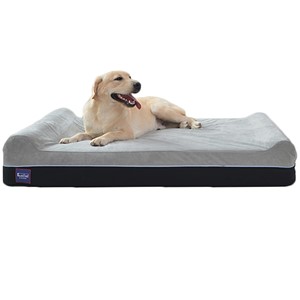
Laifug Large Grey Orthopedic Rectangle Bed
Price At Time of Publish $130.00
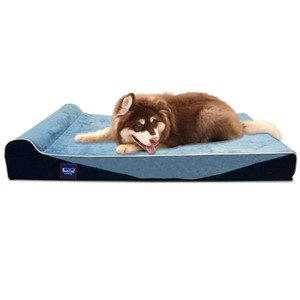
Laifug Large Blue Orthopedic Rectangle Bed
Price At Time of Publish $130.00 $110.00
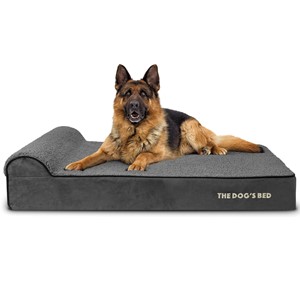
The Dogs Bed XL Grey Orthopedic Rectangle Bed
Price At Time of Publish $130.00 $185.00
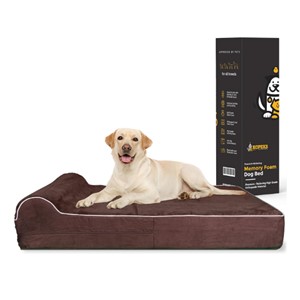
KOPEKS Jumbo Orthopedic Rectangular Bed
Price At Time of Publish $130.00 $110.00
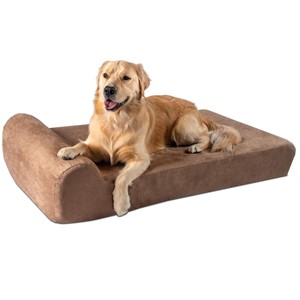
Big Barker XL Orthopedic Rectangle Bed
Price At Time of Publish $130.00 $240.00
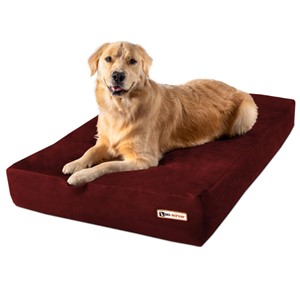
Big Barker XL Burgundy Orthopedic Rectangle Bed
Price At Time of Publish $130.00 $200.00
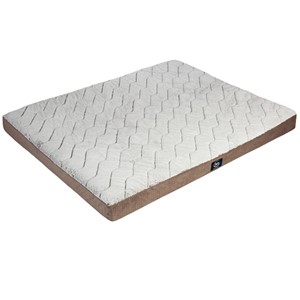
Serta XL Brown Orthopedic Rectangle Bed
Price At Time of Publish $130.00 $80.00
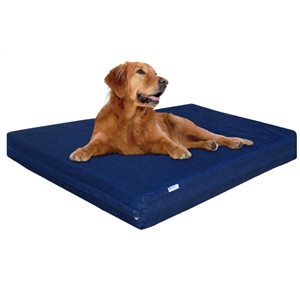
DogBed4Less XL Blue Orthopedic Rectangle Bed
Price At Time of Publish $130.00 $80.00
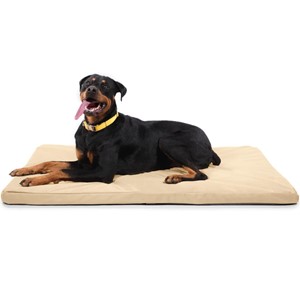
K9 Ballistics XL Sandstone Orthopedic Crate Pad
Price At Time of Publish $130.00 $159.00
Shop Bolster Dog Beds
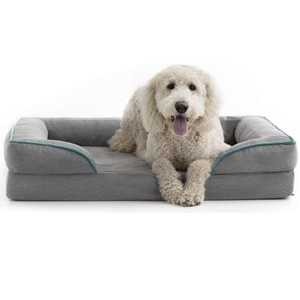
Brindle XL Gray Orthopedic Bolster Bed
Price At Time of Publish $130.00 $79.00
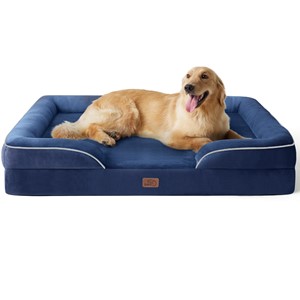
Bedsure XL Blue Orthopedic Bolster Bed
Price At Time of Publish $130.00 $76.00
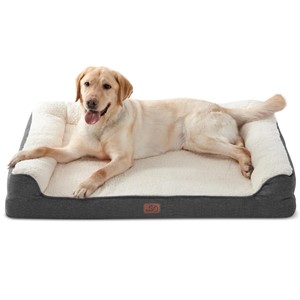
Bedsure XL Grey Orthopedic Bolster Bed
Price At Time of Publish $130.00 $60.00
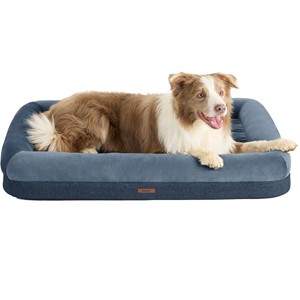
Lesure XL Navy Orthopedic Bolster Bed
Price At Time of Publish $130.00 $40.00
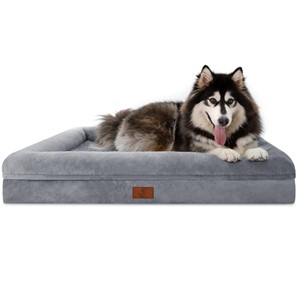
Yiruka XL Grey Orthopedic Bolster Bed
Price At Time of Publish $130.00 $55.00
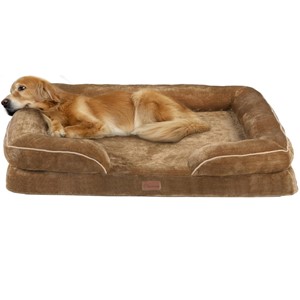
Yitahome XL Brown Orthopedic Bolster Bed
Price At Time of Publish $130.00 $37.00
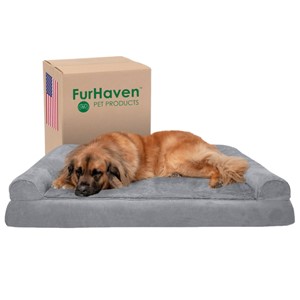
Furhaven XL Gray Orthopedic Bolster Bed
Price At Time of Publish $130.00 $130.00
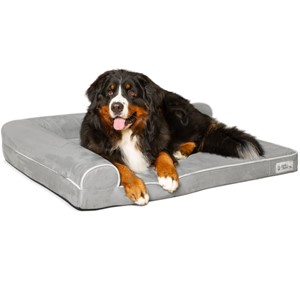
PetFusion XL Grey Orthopedic Bolster Bed
Price At Time of Publish $130.00 $60.00
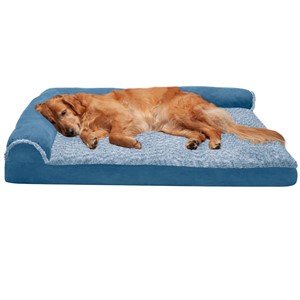
Furhaven Jumbo Blue Orthopedic Bolster Bed
Price At Time of Publish $130.00 $60.00
Shop Elevated Dog Beds
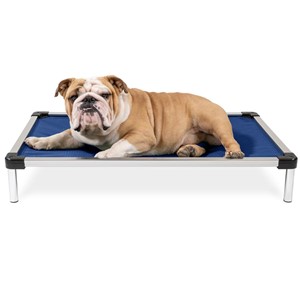
K9 Ballistics Chew Proof Elevated Small Bed
Price At Time of Publish $130.00 $129.00
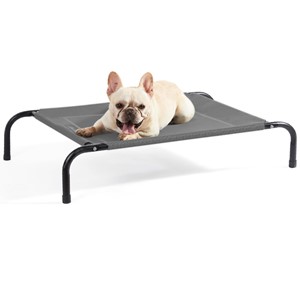
Bedsure Medium Elevated Dog Bed
Price At Time of Publish $130.00 $33.00
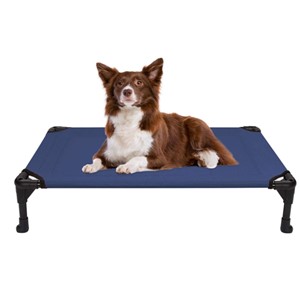
Veehoo Medium Elevated Dog Bed
Price At Time of Publish $130.00 $45.00
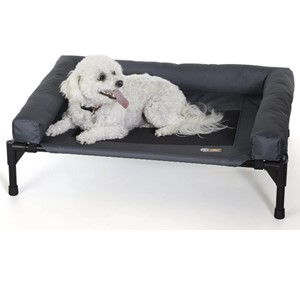
K&H Pet Products Elevated Bolster Dog Bed
Price At Time of Publish $130.00 $57.00
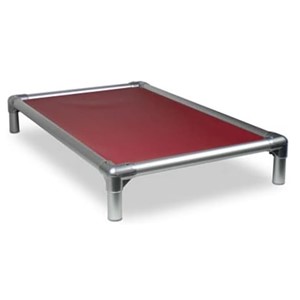
Kuranda Elevated Chew Proof Small Dog Bed
Price At Time of Publish $130.00 $134.00
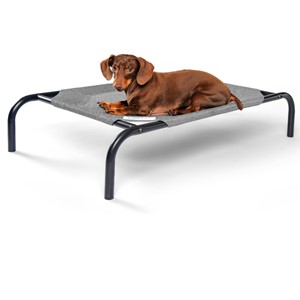
Coolaroo Small Elevated Dog Bed
Price At Time of Publish $130.00 $21.00
Related Articles
Below are some articles that may be of interest to you. Just select or click on the topic you want to learn more about.
- Best Dog Training Toys
- Best Healthy Dog Food Brands
- Dog Training Techniques
- How To Train A Puppy
- Positive Reinforcement for Dog Training
- Puppy Proofing Your House
- Using Alexa for Dog Behaviors
Go back to the Dog Luxury Beds home page.
